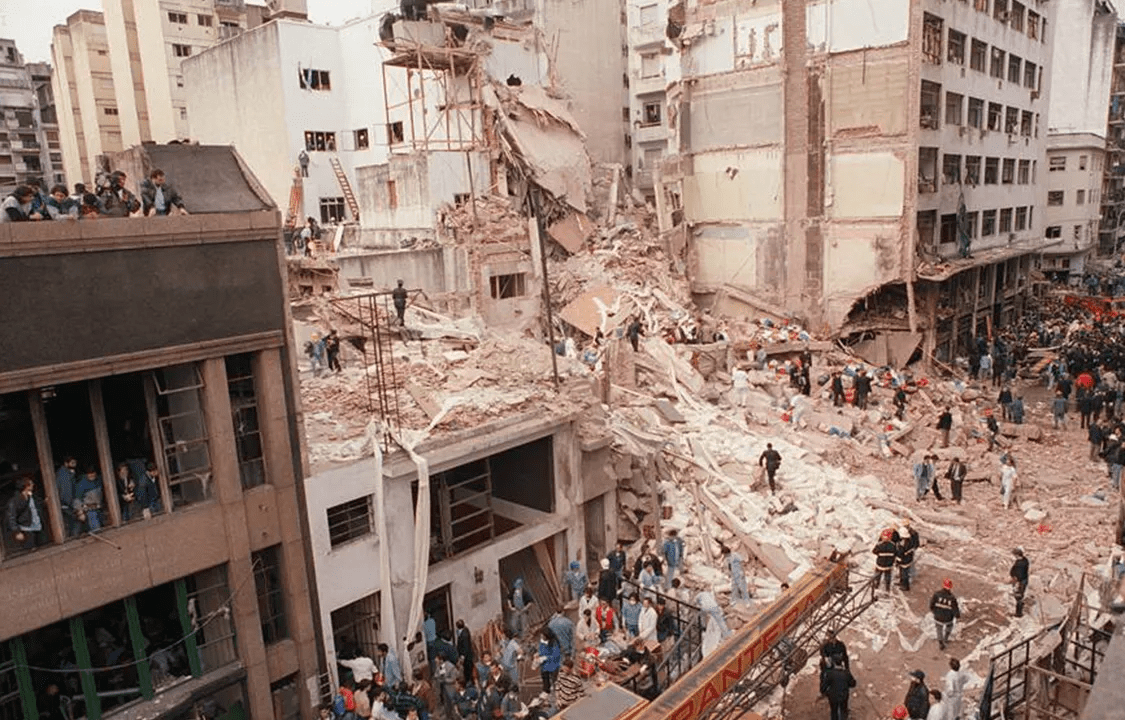Amid the possibility of Iranian retaliation against Israel, an Argentine court ruled that Iran was responsible for attacks in the 1990s on the Israeli embassy and a Jewish center, which left dozens dead
More than three decades later, Argentina has blamed Iran for terrorist attacks carried out against the Israeli embassy in 1992 and the Jewish center of the Argentine Israelite Mutual Association (AMIA) in 1994. According to the local press, an Argentine court blamed the country for the attacks and declared it a “terrorist state”.
According to court documents cited by the press, the Argentine court also blamed Hezbollah, the Lebanese Shiite terrorist movement supported by Iran, and classified the attack on AMIA, the deadliest in Argentina’s history, as a “crime against humanity”.
The judges blame the then president Ali Akbar Hashemi Bahramaie Rafsanjani, as well as other Iranian authorities and members of Hezbollah for the tragedy. One of the three magistrates who issued the ruling, Carlos Mahiques, told an Argentine radio station that “Hezbollah carried out an operation that responded to a political, ideological and revolutionary design under the mandate of a government, of a state”, referring to Iran.
The attacks
Both attacks were carried out with explosives. In 1992, a bomb attack on the Israeli embassy left 29 dead. Two years later, a truck loaded with explosives drove into the AMIA Jewish center and detonated its cargo, leaving 85 dead and 300 injured. The 1994 attack was never claimed or solved, but Argentina and Israel suspected that Hezbollah carried it out at Iran’s request. Prosecutors even accused Iranian authorities of ordering the attack, but Tehran denied any involvement.
In 2015, Argentinian prosecutor Alberto Nisman, who was investigating the terrorist attack on AMIA, was shot in the head in his Puerto Madero apartment. Nisman had denounced former president Cristina Kirchner for covering up the involvement of Iranian terrorists in the attack and, according to the judges, the murder was “a direct consequence of the denunciation”.
The Argentine president at the time of the attack, Carlos Menem, was tried for covering up the attack on AMIA, but was acquitted. His former chief secretary of Argentine intelligence, Hugo Anzorreguy, was sentenced to four and a half years in prison for his role in obstructing the investigation. He was among a dozen defendants who faced a series of corruption and obstruction of justice charges in the case, including the former judge who led the investigation into the attack, Juan José Galeano, who was sentenced in 2019 to six years in prison for concealing and tampering with evidence.
The current situation
According to US intelligence reports, Iran could launch an attack on Israeli soil in the next 24 to 48 hours. The information was published in the Wall Street Journal and came from the testimony of a US official. CBS News quoted two unidentified US officials as saying that a major attack by Iran could take place later today, possibly including more than 100 drones and dozens of missiles aimed at military targets inside the country. The officials also added that Tehran may opt for a smaller-scale attack in order to avoid a dramatic escalation.
Multiple Iranian threats and intelligence assessments have left Israel on high alert. The possible attack on Israeli targets is thought to be an attempt at revenge for the airstrike carried out against an Iranian consulate building in Damascus, the Syrian capital, on April 1, which killed several Islamic Revolutionary Guard Corps commanders, including two generals. Tehran and Damascus blamed Israel for the attack and promised revenge, although Jerusalem has not commented on the matter.
Analysis
For political scientist André Lajst, executive president of StandWithUs Brasil, the fact that Argentina is holding Iran responsible for the attacks it has suffered and now considers the Iranian regime a terrorist is an important move that he hopes will serve as an example for other countries, including Brazil.
“The Islamic regime of the Ayatollahs of Iran finances, arms and controls terrorist groups in different parts of the Middle East, using third parties to carry out attacks: Hezbollah in Lebanon, Hamas and Islamic Jihad in Gaza, the Houthis in Yemen and others in Syria, Iraq, etc,” explains Lajst. “Through these groups, Iran always seeks to attack the State of Israel and the Jews, wherever they are – whether in Argentina 30 years ago or in Israel as we see today. We hope that, like Argentina, Brazil will also recognize Iran as a terrorist state, as well as Hamas and Islamic Jihad as terrorist groups working on its behalf, without having to go through a tragedy to prove it.”
The expert also points out that Iran’s actions are based on “expansionist and imperialist intentions, which destabilize not only Israel, but several Middle Eastern countries that also see Iran as an enemy country”, and cites as an example the statement made earlier this month by the Fatah party, led by Palestinian Authority (PA) President Mahmoud Abbas, condemning Iranian involvement in internal political problems in the Palestinian Authority, and calling for an end to intervention in Palestinian national affairs.
At the time, Lajst stated in a post on X (formerly Twitter) that the current scenario “demonstrates how much Iran has contributed to instability in the Middle East and international politics in general, and is a threat not only to Israel’s security, but to the Palestinians themselves.”
Source: Times of Israel *** Translated by DEFCONPress FYI Team ***
